Theologico-Political Treatise — Part 2 by Benedictus de Spinoza
“The Theologico-Political Treatise — Part 2” by Benedictus de Spinoza is a philosophical work that examines the relationship between religion and politics, likely written in the 17th century. This part (Chapters VI to X) delves into the concepts of miracles, the interpretation of scripture, and the authorship of biblical texts, challenging traditional religious dogmas and advocating a rational approach to religious texts and their meanings. At the start of this section, Spinoza
critiques the common understanding of miracles, arguing that they contradict the immutable laws of nature established by God. He asserts that many events labeled as miracles can be explained through natural causes, emphasizing that true knowledge of God and His providence is best derived from the consistent order of nature rather than extraordinary occurrences. Furthermore, he reflects on the authorship of biblical texts, particularly the Pentateuch, suggesting that they were not written by Moses but rather by later authors. Spinoza’s rigorous examination invites readers to reflect on the interplay of faith and reason, and the interpretation of sacred texts based on historical and contextual analysis. (This is an automatically generated summary.)
Read or download for free
| How to read | Url | Size | |||
|---|---|---|---|---|---|
| Read now! | https://www.gutenberg.org/ebooks/990.html.images | 214 kB | |||
| EPUB3 (E-readers incl. Send-to-Kindle) | https://www.gutenberg.org/ebooks/990.epub3.images | 147 kB | |||
| EPUB (older E-readers) | https://www.gutenberg.org/ebooks/990.epub.images | 150 kB | |||
| EPUB (no images, older E-readers) | https://www.gutenberg.org/ebooks/990.epub.noimages | 142 kB | |||
| Kindle | https://www.gutenberg.org/ebooks/990.kf8.images | 296 kB | |||
| older Kindles | https://www.gutenberg.org/ebooks/990.kindle.images | 288 kB | |||
| Plain Text UTF-8 | https://www.gutenberg.org/ebooks/990.txt.utf-8 | 204 kB | |||
| Download HTML (zip) | https://www.gutenberg.org/cache/epub/990/pg990-h.zip | 145 kB | |||
| There may be more files related to this item. | |||||
Similar Books
About this eBook
| Author | Spinoza, Benedictus de, 1632-1677 |
|---|---|
| Translator | Elwes, R. H. M. (Robert Harvey Monro), 1853- |
| Title | Theologico-Political Treatise — Part 2 |
| Note | Reading ease score: 55.5 (10th to 12th grade). Somewhat difficult to read. |
| Note | Wikipedia page about this book: https://en.wikipedia.org/wiki/Tractatus_Theologico-Politicus |
| Credits | Produced by Joseph B. Yesselman. HTML version by Al Haines. |
| Language | English |
| LoC Class | B: Philosophy, Psychology, Religion |
| Subject | Philosophy and religion -- Early works to 1800 |
| Subject | Free thought -- Early works to 1800 |
| Subject | Political science -- Early works to 1800 |
| Category | Text |
| EBook-No. | 990 |
| Release Date | Jul 1, 1997 |
| Most Recently Updated | Jan 18, 2021 |
| Copyright Status | Public domain in the USA. |
| Downloads | 292 downloads in the last 30 days. |
| Project Gutenberg eBooks are always free! | |


